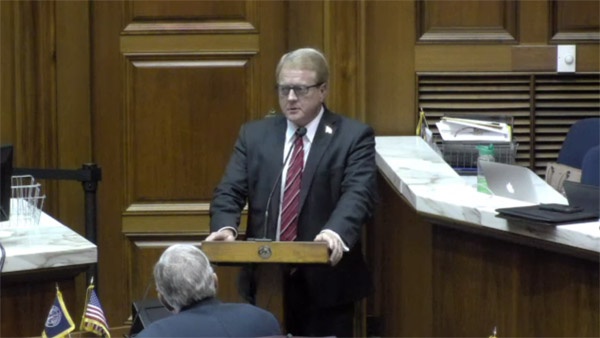Lawmakers heard hours of testimony from those on both sides of the issue Thursday.

Aaron Negangard, former prosecutor of Dearborn and Ohio counties, shares testimony on medical marijuana at a meeting of the Indiana legislature's interim study committee on public health on Thursday, October 18.
(Indianapolis, Ind.) - A summer study session on the legalization of medical marijuana in Indiana has concluded.
Both supporters and those against it spoke Thursday as the legislature’s interim study committee on public health met. After hearing three hours of testimony on all sides of the argument, the committee declined to forward a recommendation to the full legislature that marijuana be legalized to treat chronic health conditions under the supervision by a new state regulatory agency.
The committee also denied to condone further study of medical marijuana.
State Rep. Jim Lucas (R-Seymour) told the panel that he is crafting a medical marijuana bill for the 2019 session. He told fellow lawmakers that he tried marijuana during a recent trip to Colorado.
“I’m going to make it my mission as a legislator, as a fellow Hoosier, to make sure that this issue moves forward,” Lucas said.
Despite the legalization of CBD oil use earlier this year, many at the Indiana Statehouse still oppose medical marijuana, worrying that it could become more available to children.
But Aaron Negangard, the Indiana Attorney General’s chief deputy and the former prosecutor for Dearborn and Ohio counties, said the AG’s office supports further research on the issue, but not legalization. He shared some words of caution.
“As prosecutor for Dearborn and Ohio counties for several years, I spoke to hundreds of opioid addicts. All but one started smoking marijuana. The one that didn’t was an 11-year-old whose father gave her heroin,” Negangard told the committee.
“I think the evidence is clear that this is not the right time for Indiana to go down this road,” he concluded.
The Indiana Chamber of Commerce shared its concerns with what medical marijuana legalization may mean for the state’s businesses. Mike Ripley, the chamber’s vice president of health care policy, said employers worry about workers whose motor skills, memory and judgment may be impacted by use. He pointed to other states where it has been legalized, making employee drug testing more complicated and expensive.
Those in favor of legalization point to the potential new revenue stream it could create for the state’s coffers. Assistant Clinical Professor at the Indiana University School of Medicine Dr. David Schwartz said medical marijuana could also help combat Indiana’s opioid epidemic.
“(Doctors) would tell you that any day of the week they would rather have a patient come in using medical marijuana than an opioid. They are able to control those patients. Nobody has ever died from it. It’s a way we can finally treat our people,” Schwartz said.
More than 30 states allow marijuana to be used for medical purposes, including neighboring states Ohio, Michigan and Illinois. Tim Butler, a state representative from Illinois, told the panel that he has heard from chronically ill people who were able to resume to normal life with the use of marijuana.
Ohio's medical marijuana program is due to launch by the end of this year.
RELATED STORIES:
Hamilton County's Two Medical Marijuana Dispensaries Will Be Located In Cincinnati

 Indiana Approves Student-Centered K-12 Accountability Model with Unanimous Support
Indiana Approves Student-Centered K-12 Accountability Model with Unanimous Support
 Gov. Mike Braun Awards Coach Curt Cignetti Indiana’s Highest Honor
Gov. Mike Braun Awards Coach Curt Cignetti Indiana’s Highest Honor
 Sen. Maxwell Welcomes Local Students to Statehouse as Senate Pages
Sen. Maxwell Welcomes Local Students to Statehouse as Senate Pages
 Liberty Theater Receives 18 "Best of Cincinnati" Nominations
Liberty Theater Receives 18 "Best of Cincinnati" Nominations
 Several Franklin Co. Roads Closed Due to Flooding
Several Franklin Co. Roads Closed Due to Flooding
 Sunman Woman Accused of Official Misconduct, Theft
Sunman Woman Accused of Official Misconduct, Theft











